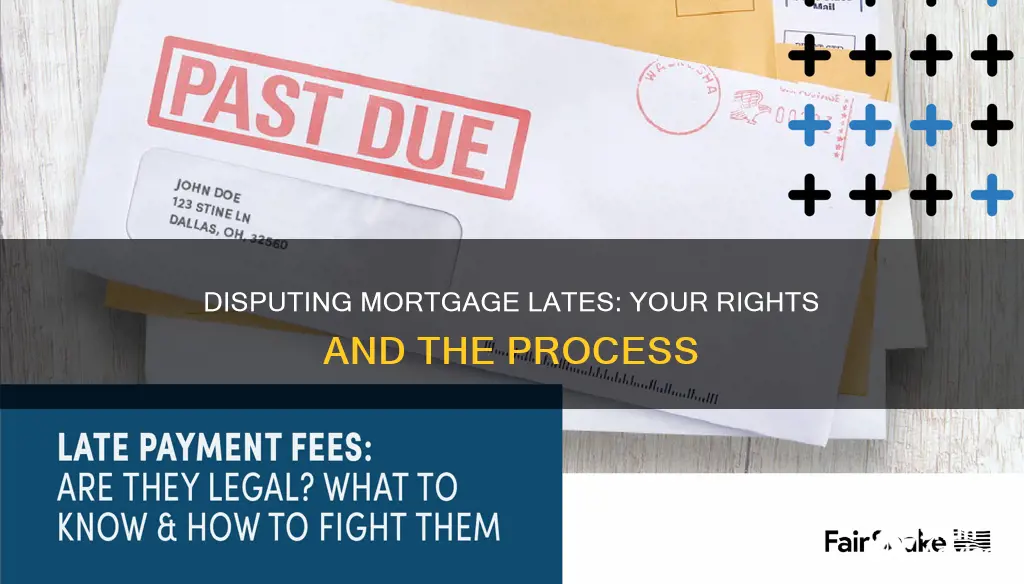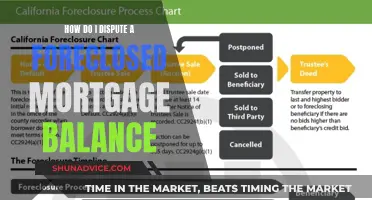
Late mortgage payments can severely damage your credit score and your ability to get credit in the future. Mortgage servicers sometimes make errors when handling a homeowner's loan account, and a late payment could be the result of a mistake on their part. If you believe this to be the case, you can dispute the late payment with your mortgage servicer. To do this, you should contact your mortgage servicer by phone or in writing. If you write to them, you will have a paper trail of your attempts to have the error corrected. You should include your name, home address, and mortgage account number, and explain exactly what error you believe occurred. Your servicer must respond to your dispute within 30 days.
| Characteristics | Values |
|---|---|
| What to do if you receive a late payment notice | Call the mortgage company to track it down in case there’s a problem with your account. |
| What to do if your account shows you are paying late | Don't subtract the disputed amount from your mortgage payment. Keep making your regular monthly mortgage payment. |
| What to do if you think the mortgage late was the fault of the bank or lender | Get a copy of your credit reports, get in touch with the bank, lender, or loan servicer reporting the late(s) and if they were at fault, get a letter of admission from them and ask them to fix it. |
| What to do if it was your fault | You can still try to dispute the delinquency and get it removed. |
| What to do if you are unable to resolve the issue with your lender | File a complaint with the Consumer Financial Protection Bureau (CFPB). |
| What to do if the mortgage company made deceptive statements, omitted important facts, or took misleading actions | Report them to the Federal Trade Commission (FTC). |
| What to do if you have a problem with your mortgage | Submit a complaint online or by calling (855) 411-CFPB (2372). You can also reach out to a housing counselor or call the HOPE™ Hotline at (888) 995-HOPE (4673). |
| What to do if you are facing imminent foreclosure or have been served with legal papers | Consult an attorney. |
| What to include in your letter to the mortgage servicer | Your name, home address, and mortgage account number. Use the name that is on your mortgage. Identify the error or the information you are requesting. |
| Where to send your letter | Send your letter to the mortgage servicer’s customer service address by certified mail and request a return receipt. |
| What to do if you call the mortgage servicer | Get the name of the person you speak with and make written notes about what was said, including the date and time. |
What You'll Learn

Common mortgage servicer errors
Mortgage servicers are known for making mistakes when managing borrowers' mortgage loans. These errors can have a devastating impact on homeowners, so it's important to be vigilant and address any issues as soon as possible. Here are some common mortgage servicer errors:
- Improperly starting a foreclosure or conducting a foreclosure sale in violation of federal mortgage servicing laws: This is a serious issue that can have severe consequences for homeowners. If you believe your mortgage servicer has improperly initiated foreclosure proceedings, you should seek legal advice immediately.
- Failing to credit payments promptly: Under the prompt crediting rule, servicers must credit your payment on the day they receive the funds, with certain exceptions.
- Mishandling of escrow accounts: A mortgage servicer may collect money for property taxes and homeowners' insurance payments through an escrow account. However, they may fail to make the necessary payments from this account, leading to potential tax foreclosures or gaps in insurance coverage.
- Charging incorrect fees: This includes charging inappropriate late fees, imposing invalid fees related to foreclosure, or charging excessive fees.
- Not honouring modifications: When a loan is transferred to a new servicer, they may refuse to honour modifications set up by the previous servicer.
- Failure to provide information: Mortgage servicers are required to provide certain information upon request, such as the identity, address, or contact information for the owner of your mortgage loan, within specified time frames.
- Dual tracking: This occurs when the mortgage servicer appears to be negotiating with the homeowner to modify their loan while simultaneously pursuing foreclosure.
- Not reviewing applications in a timely manner: Mortgage servicers are expected to review applications within a reasonable timeframe, generally around 30 days.
If you believe your mortgage servicer has made an error, it's important to take action. You can start by reviewing your records, including mortgage statements, payment histories, and any relevant documents. Compare these with the information provided by your servicer to identify any discrepancies. If you find an error, you should contact your servicer in writing, providing a clear and detailed explanation of the issue, along with any supporting documentation. Keep in mind that there are specific procedures and time frames outlined by the Real Estate Settlement Procedures Act (RESPA) that govern how servicers must handle these disputes.
Switching Mortgage Providers: A Guide to Changing Lenders
You may want to see also

How to dispute an error
If you need to dispute an error with your mortgage servicer, it's important to act quickly to prevent the issue from escalating into larger problems, such as foreclosure. Here are the steps you can take:
Step 1: Identify the Error
Review all letters, emails, and statements from your mortgage servicer. Check that their records match yours, including your monthly payment coupons or statements. Common errors made by mortgage servicing companies include incorrectly applying or crediting payments, charging unreasonable fees, and failing to pay homeowner's insurance or property taxes on time.
Step 2: Contact Your Servicer
If you identify an error, contact your mortgage servicer as soon as possible. You can call the company to resolve minor issues, but for more complex problems, it is recommended to write a letter to the company. This provides you with a paper trail of your attempts to correct the error. Include your name, home address, mortgage account number, and a clear explanation of the error or the information you are requesting. Send your letter and any supporting documents by certified mail to the mortgage servicer's customer service address, and request a return receipt. Keep a copy of your letter and the original documents for your records.
Step 3: Understand the Servicer's Response Process
Under the Real Estate Settlement Procedures Act (RESPA), your servicer must acknowledge your letter ("qualified written request") in writing within five business days of receiving it. They then have 30 business days to correct your account or determine that no error occurred. If they need more time, they must inform you within the initial 30-day period and can extend the deadline by up to 15 days. They must then provide you with a written notice explaining the action they took, the reason for their decision, and contact information for further assistance.
Step 4: Follow Up if Necessary
If you are unable to resolve the issue with your mortgage servicer, you can file a complaint with the Consumer Financial Protection Bureau (CFPB) or your state consumer protection office. You can also submit a complaint online or by calling the CFPB. Additionally, consider consulting an attorney, especially one specializing in helping homeowners with complex mortgage errors.
A Guide to Assuming a VA Mortgage
You may want to see also

Requesting information from your servicer
Firstly, you need to identify your mortgage servicer. Check your mortgage statement or coupon payment book to find the name of your servicer. It is not uncommon for your servicer to change, so be sure to review all letters, emails, and statements to ensure you have the correct and most up-to-date information.
Once you have identified your servicer, you should contact them to request information about your mortgage account. You can call the company to resolve minor issues, but for more complex matters, it is advisable to write a letter. Sending a letter creates a paper trail, which can be useful if the dispute is not quickly resolved. Be sure to address your letter to the correct address, as mortgage servicers may have a special address for handling borrower requests. Include your name, home address, and mortgage account number in the letter, and clearly state the information you are requesting. You can also submit a complaint online or contact a housing counselor for guidance.
Under the Real Estate Settlement Procedures Act (RESPA), your servicer must acknowledge your request in writing within five business days of receiving it. They are generally required to provide the requested information within 30 business days, although this timeframe may vary depending on the specific information requested. For example, if you are trying to obtain the identity, address, or contact information for the owner of your mortgage loan, the servicer must respond within ten business days.
Remember to keep a copy of your letter and any supporting documents you send. It is also important to maintain a file of all communications between you and your mortgage servicer related to the information request. This documentation will be valuable if you need to escalate the matter or seek legal assistance.
Enhancing Your Mortgage: Strategies for Financial Empowerment
You may want to see also

What to do if your servicer doesn't respond
If your mortgage servicer doesn't respond to your dispute, there are a few steps you can take to try and resolve the issue. Firstly, it's important to ensure that you have followed the correct procedure in submitting your dispute. This includes sending your dispute to the correct address and including all the necessary information in your letter. You can usually find the correct address on your monthly mortgage statement or coupon book, on the servicer's website, or by calling the servicer.
Your letter should include your name, home address, and mortgage account number, and clearly identify the error or information you are requesting. It is also recommended that you include any supporting documents or records that back up your dispute. It is important to keep making your regular monthly mortgage payments during this time, to avoid any further issues or penalties.
If you have followed the correct procedure and your servicer still doesn't respond, you can consider contacting a lawyer or a HUD-approved housing counselor for assistance. An attorney can advise you on your rights and help protect them, especially if you are facing foreclosure. You can also try submitting a complaint online or by calling the CFPB, or reaching out to the HOPE™ Hotline, which is open 24 hours a day, seven days a week.
Becoming a Self-Employed Mortgage Advisor: Steps to Success
You may want to see also

Your rights when paying your mortgage
When it comes to making your mortgage payments and how your servicer manages your account, you have rights. The company that handles the daily management of your account is known as the servicer. This company is usually the one you borrow the money from, such as a bank, credit union, or mortgage company. However, sometimes a separate company is arranged to act as the servicer.
If you receive a notice that your servicer has changed, you should call your current servicer to confirm the new mortgage servicer before sending in your next payment. This will ensure that your payment goes to the right place and avoid any delays. It is not uncommon for your servicer to change, and you will receive notices from both your old and new servicers. These notices will include the contact information for the new servicer, the date they start accepting your payments, and what to do if you have any questions or complaints.
If you are unable to pay your mortgage or are concerned about missing a payment, you should contact your mortgage servicer immediately. You can find their contact information on your monthly mortgage loan statement, in your mortgage loan coupon book, or on their website. Additionally, you can contact a HUD-approved housing counseling agency for free expert assistance on avoiding foreclosure. Many mortgage servicers have programs to help people in this situation.
If your servicer has made a mistake or charged you a fee you don't owe, address it as soon as possible. Continue making your regular monthly mortgage payments and do not subtract the disputed amount. Some servicers will refuse to accept what they consider a "partial" payment. Instead, contact your servicer in writing and explain the problem using a "qualified written request". Include your name, home address, mortgage account number, and an explanation of the error. Send your letter and any supporting documents to the mortgage servicer's customer service address by certified mail and request a return receipt. Keep a copy of your letter and the original documents you sent. Your servicer must acknowledge your letter in writing within five business days and take action or provide an explanation within 30 business days.
If you have a problem with your mortgage, you can submit a complaint online or by calling the CFPB. You can also reach out to a housing counselor through the CFPB's "Find a Counselor" tool or by calling the HOPE™ Hotline. If you are facing foreclosure or have been served legal papers, you may need to consult an attorney.
Second Charge Mortgages: Application Process and Requirements
You may want to see also
Frequently asked questions
Call the mortgage company to track it down in case there’s a problem with your account. Late payments can impact your credit score and ability to get credit in the future.
Mortgage servicing companies may not correctly apply or credit payments, refuse to accept conforming payments, claim a payment was late and charge a late fee, charge unreasonable fees, or fail to pay homeowner’s insurance or property taxes on time.
Contact your mortgage servicer by phone or by writing to them. If writing, use the sample complaint letter and include your name, home address, mortgage account number, and an explanation of the error. Send the letter to the mortgage servicer's customer service address by certified mail and request a return receipt.
Your mortgage servicer must acknowledge your letter in writing within five business days of receiving it and must correct your account or respond that there is no error within 30 business days. They must also send you a written notice of the action taken and the name and phone number of someone to contact for more information.
If your mortgage servicer doesn't respond to your dispute, you can file a complaint with the Consumer Financial Protection Bureau (CFPB) or your state consumer protection office. You can also submit a complaint online, call the HOPE Hotline, or reach out to a housing counsellor.







